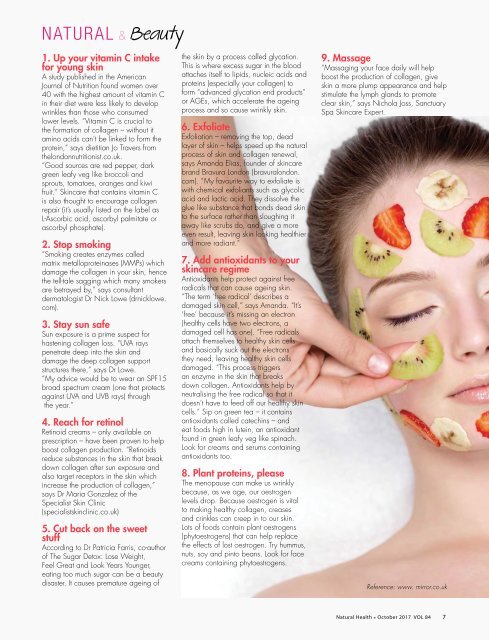Natural Health October 2017
You also want an ePaper? Increase the reach of your titles
YUMPU automatically turns print PDFs into web optimized ePapers that Google loves.
NATURAL & Beauty<br />
1. Up your vitamin C intake<br />
for young skin<br />
A study published in the American<br />
Journal of Nutrition found women over<br />
40 with the highest amount of vitamin C<br />
in their diet were less likely to develop<br />
wrinkles than those who consumed<br />
lower levels. “Vitamin C is crucial to<br />
the formation of collagen – without it<br />
amino acids can’t be linked to form the<br />
protein,” says dietitian Jo Travers from<br />
thelondonnutritionist.co.uk.<br />
“Good sources are red pepper, dark<br />
green leafy veg like broccoli and<br />
sprouts, tomatoes, oranges and kiwi<br />
fruit.” Skincare that contains vitamin C<br />
is also thought to encourage collagen<br />
repair (it’s usually listed on the label as<br />
L-Ascorbic acid, ascorbyl palmitate or<br />
ascorbyl phosphate).<br />
2. Stop smoking<br />
“Smoking creates enzymes called<br />
matrix metalloproteinases (MMPs) which<br />
damage the collagen in your skin, hence<br />
the tell-tale sagging which many smokers<br />
are betrayed by,” says consultant<br />
dermatologist Dr Nick Lowe (drnicklowe.<br />
com).<br />
3. Stay sun safe<br />
Sun exposure is a prime suspect for<br />
hastening collagen loss. “UVA rays<br />
penetrate deep into the skin and<br />
damage the deep collagen support<br />
structures there,” says Dr Lowe.<br />
“My advice would be to wear an SPF15<br />
broad spectrum cream (one that protects<br />
against UVA and UVB rays) through<br />
the year.”<br />
4. Reach for retinol<br />
Retinoid creams – only available on<br />
prescription – have been proven to help<br />
boost collagen production. “Retinoids<br />
reduce substances in the skin that break<br />
down collagen after sun exposure and<br />
also target receptors in the skin which<br />
increase the production of collagen,”<br />
says Dr Maria Gonzalez of the<br />
Specialist Skin Clinic<br />
(specialistskinclinic.co.uk)<br />
5. Cut back on the sweet<br />
stuff<br />
According to Dr Patricia Farris, co-author<br />
of The Sugar Detox: Lose Weight,<br />
Feel Great and Look Years Younger,<br />
eating too much sugar can be a beauty<br />
disaster. It causes premature ageing of<br />
the skin by a process called glycation.<br />
This is where excess sugar in the blood<br />
attaches itself to lipids, nucleic acids and<br />
proteins (especially your collagen) to<br />
form “advanced glycation end products”<br />
or AGEs, which accelerate the ageing<br />
process and so cause wrinkly skin.<br />
6. Exfoliate<br />
Exfoliation – removing the top, dead<br />
layer of skin – helps speed up the natural<br />
process of skin and collagen renewal,<br />
says Amanda Elias, founder of skincare<br />
brand Bravura London (bravuralondon.<br />
com). “My favourite way to exfoliate is<br />
with chemical exfoliants such as glycolic<br />
acid and lactic acid. They dissolve the<br />
glue like substance that bonds dead skin<br />
to the surface rather than sloughing it<br />
away like scrubs do, and give a more<br />
even result, leaving skin looking healthier<br />
and more radiant.”<br />
7. Add antioxidants to your<br />
skincare regime<br />
Antioxidants help protect against free<br />
radicals that can cause ageing skin.<br />
“The term ‘free radical’ describes a<br />
damaged skin cell,” says Amanda. “It’s<br />
‘free’ because it’s missing an electron<br />
(healthy cells have two electrons, a<br />
damaged cell has one). “Free radicals<br />
attach themselves to healthy skin cells<br />
and basically suck out the electrons<br />
they need, leaving healthy skin cells<br />
damaged. “This process triggers<br />
an enzyme in the skin that breaks<br />
down collagen. Antioxidants help by<br />
neutralising the free radical so that it<br />
doesn’t have to feed off our healthy skin<br />
cells.” Sip on green tea – it contains<br />
antioxidants called catechins – and<br />
eat foods high in lutein, an antioxidant<br />
found in green leafy veg like spinach.<br />
Look for creams and serums containing<br />
antioxidants too.<br />
8. Plant proteins, please<br />
The menopause can make us wrinkly<br />
because, as we age, our oestrogen<br />
levels drop. Because oestrogen is vital<br />
to making healthy collagen, creases<br />
and crinkles can creep in to our skin.<br />
Lots of foods contain plant oestrogens<br />
(phytoestrogens) that can help replace<br />
the effects of lost oestrogen. Try hummus,<br />
nuts, soy and pinto beans. Look for face<br />
creams containing phytoestrogens.<br />
9. Massage<br />
“Massaging your face daily will help<br />
boost the production of collagen, give<br />
skin a more plump appearance and help<br />
stimulate the lymph glands to promote<br />
clear skin,” says Nichola Joss, Sanctuary<br />
Spa Skincare Expert.<br />
Reference: www. mirror.co.uk<br />
<strong>Natural</strong> <strong>Health</strong> * <strong>October</strong> <strong>2017</strong> VOL 84<br />
7

















